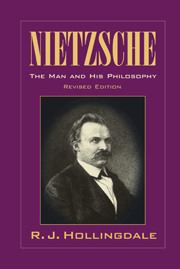Book contents
- Frontmatter
- Contents
- Preface to the Revised Edition
- A List of Nietzsche's Works
- Part I 1844-1869
- Part II 1869-1879
- Part III 1879-1889
- 8 The Turning-Point
- 9 The Wanderer
- 10 Lou Salome
- 11 Zarathustra
- 12 The Solitary
- 13 The Year 1888
- 14 The Revaluation
- 15 The Poet
- 16 The Collapse
- PART IV 1889-1900
- Postscript 1999
- Selective Bibliography
- Index
15 - The Poet
from Part III - 1879-1889
Published online by Cambridge University Press: 13 September 2019
- Frontmatter
- Contents
- Preface to the Revised Edition
- A List of Nietzsche's Works
- Part I 1844-1869
- Part II 1869-1879
- Part III 1879-1889
- 8 The Turning-Point
- 9 The Wanderer
- 10 Lou Salome
- 11 Zarathustra
- 12 The Solitary
- 13 The Year 1888
- 14 The Revaluation
- 15 The Poet
- 16 The Collapse
- PART IV 1889-1900
- Postscript 1999
- Selective Bibliography
- Index
Summary
Artists continually glorify—they do nothing else: they glorify all those conditions and things which have the reputation of making men feel good or great or intoxicated or merry or happy or wise. (FW 85)
Throughout the years of his maturity Nietzsche never ceased to write poetry, and although his achievements in verse cannot compare with his achievements in prose they are of interest as a parallel expression of the two sides of his personality I have called the Socratic and the Heraclitean. At one extreme are the little epigrammatic pieces the best known of which are those prefixed to The Gay Science; at the other, the formless Dionysos-Dithyramben. Mediating between these two extremes is a strongly rhythmic and rhymed form, a development of the style of his early years and capable of expressing both the Socratic and Heraclitean attitudes.
The epigrammatic verses are essentially an intensification, by means of metre and rhyme, of the single-sentence titled aphorisms which first appeared in Human, All Too Human and its sequels; e.g.:
Test of a good marriage. A marriage proves itself a good marriage by being able to endure an occasional ‘exception’. (MA 402)
Enemies of truth. Convictions are more dangerous enemies of truth than lies. (MA 483)
The noble hypocrite. Never to talk about oneself is a very noble form of hypocrisy. (MA 505)
Bad memory. The advantage of having a bad memory is that one can enjoy the same good things for the first time several times. (MA 580)
Modesty of man. How little pleasure suffices most people to make them find life good; how modest man is! (WS 15)
Premises of the Machine Age. The printing press, the machine, the railway, the telegraph are premises whose thousand-year conclusions no one has yet had the courage to draw. (WS 278)
The most dangerous party-member. The most dangerous party-member is he whose defection would destroy the entire party: therefore the best partymember. (WS 290)
The object of aphorism is memorability through conciseness, and in the concisest of all his works, Gôtzen-Dàmmerung, Nietzsche reduces the wordage of his aphorisms to an all-but-absolute minimum; e.g.:
Even the bravest of us seldom has the courage for what he really knows. (G I 2)
From the military school of life. What does not kill me makes me stronger. (GI 8)
- Type
- Chapter
- Information
- NietzscheThe Man and His Philosophy Revised Edition, pp. 228 - 236Publisher: Cambridge University PressPrint publication year: 1999



